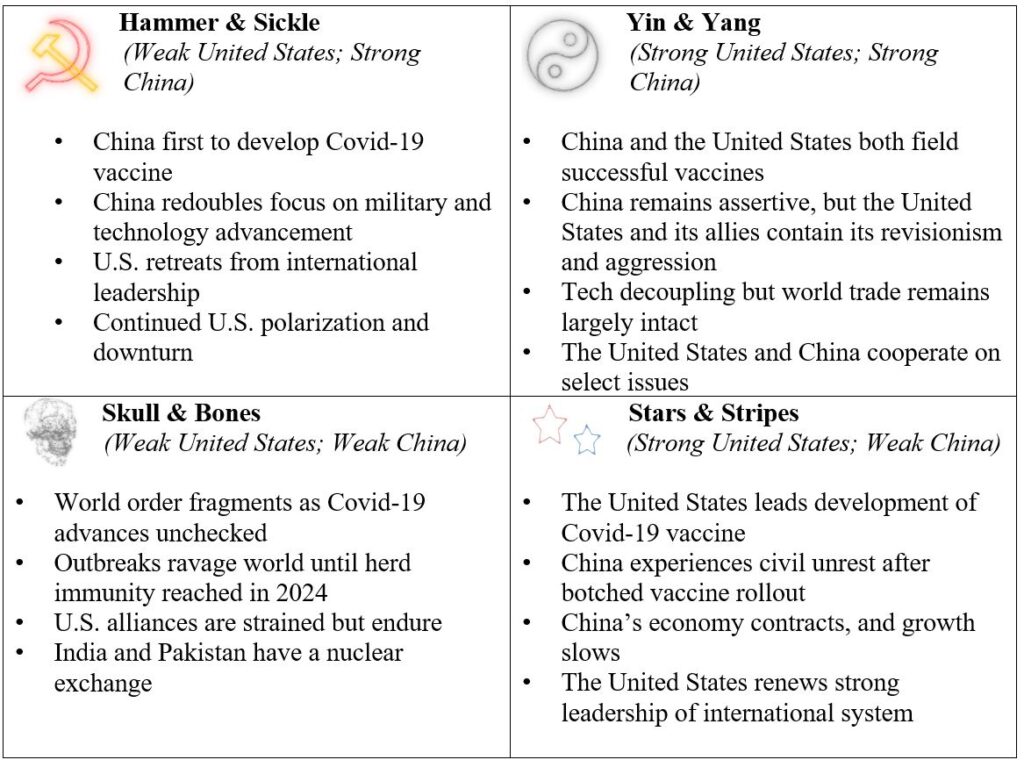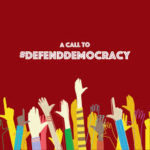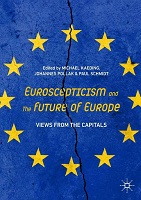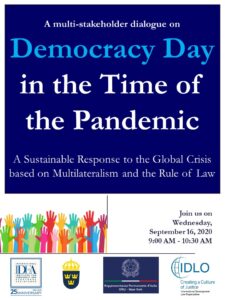The most likely outcome for a post-Covid world order in the decade ahead will not be a unipolar order or a bipolar Cold War-style competition, but a loose multipolarity, according to a new scenario analysis from the Center for Strategic and International Studies (CSIS).
Under any outcome, the relative strength of both the United States and China would be diluted or balanced by the influence and independent foreign and security policies of India, Japan, Germany, France, the United Kingdom, and others. There also emerged in the scenarios a growing number of contestations of U.S. power and influence—in particular due to the “spoiler” or other nefarious behavior of Russia, Iran, and North Korea, writes Samuel Brannen, Senior Fellow at the CSIS International Security Program and Director of its Risk and Foresight Group.

Credit: CSIS
The Covid pandemic is a multidimensional emergency that requires the efforts of all disciplines, according to a recent analysis:
- a public health crisis that demands new tools to prevent the spread of this devastating disease and to conduct effective testing and tracing;
- a medical crisis that necessitates new modalities of treatment to heal those who are afflicted;
- and, in the recent words of an open letter* whose signatories include former US Secretary of State Madeleine Albright, a “political crisis that threatens the future of liberal democracy.”
 * The National Endowment for Democracy- and International IDEA-initiated “Call to Defend Democracy,” June 25, 2020.
* The National Endowment for Democracy- and International IDEA-initiated “Call to Defend Democracy,” June 25, 2020.
COVID-19 is both a challenge and an opportunity for democracy, observers suggest.
It has brought some shortcomings of Europe’s democracies to the surface while presenting a chance to give Europeans a greater say in EU decision-making – the agenda of this autumn’s ‘Conference on the Future of Europe’, which will convene young people, civil society and European institutions.
 The COVID-19 pandemic continues to test different elements of democratic politics across the continent, notes a diverse coalition of civil society, professional and intergovernmental organisations. At the same time, the changes brought about by the pandemic have also propelled many democratic reform efforts—in civil society, political opposition forces, and the digital sphere, the groups add, calling on the European institutions to develop and implement the European Democracy Action Plan along certain lines.
The COVID-19 pandemic continues to test different elements of democratic politics across the continent, notes a diverse coalition of civil society, professional and intergovernmental organisations. At the same time, the changes brought about by the pandemic have also propelled many democratic reform efforts—in civil society, political opposition forces, and the digital sphere, the groups add, calling on the European institutions to develop and implement the European Democracy Action Plan along certain lines.
A new book Euroscepticism and the Future of Europe – demonstrates that “Euroscepticism is not something to be afraid of,” notes one observer. “It is part of a vibrant European democracy that is resilient enough to embrace those who criticize the reality of the European project.”
— Democracy Digest (@demdigest) September 18, 2020
The EU’s new ‘Action Plan Human on Rights and Democracy 2020-2024’ identifies priorities for concrete external action. In 2019, cooperation projects in support of democracy amounted to €147 million in 37 countries.
 A recent report, Global Democracy and COVID-19: Upgrading International Support, provides recommendations for policymakers and civil society to counteract the negative impacts of COVID-19 on democracy, including the need to strengthen state capacities and the role of formal institutions in democratic processes; to support new civic initiatives that are emerging as a result of the pandemic; and to put a special emphasis, within the post-pandemic development agenda, on strategic planning and inclusive analysis of experiences, in order to build preparedness of all countries across the world.
A recent report, Global Democracy and COVID-19: Upgrading International Support, provides recommendations for policymakers and civil society to counteract the negative impacts of COVID-19 on democracy, including the need to strengthen state capacities and the role of formal institutions in democratic processes; to support new civic initiatives that are emerging as a result of the pandemic; and to put a special emphasis, within the post-pandemic development agenda, on strategic planning and inclusive analysis of experiences, in order to build preparedness of all countries across the world.
International IDEA’s online resources on COVID-19 and Democracy, and in particular its Global Monitor on COVID-19’s Impact on Democracy and Human Rights, show that at least 70 countries and territories across the globe have decided to postpone national and subnational elections due to COVID-19. The pandemic has triggered several exceptional legal/constitutional responses from governments around the world as they seek extraordinary measures to manage the threat, at times impacting on human rights and the integrity of democratic processes.
What will geopolitics look like in 2025-2030? @bk31 @FedericiJoe @habibahmeddc @lindseysheppard and I conducted deep analysis on that question, and then I interviewed 30 leading experts in and out of governments to help create four scenarios exploring a post-Covid world. (1/n) pic.twitter.com/Kz9BLJrtV3
— Sam Brannen (@samwashdc) September 17, 2020







